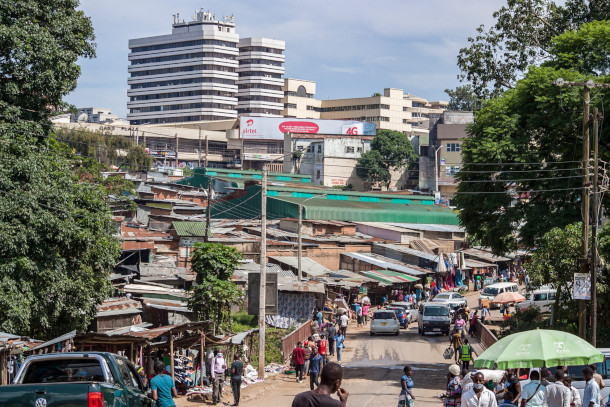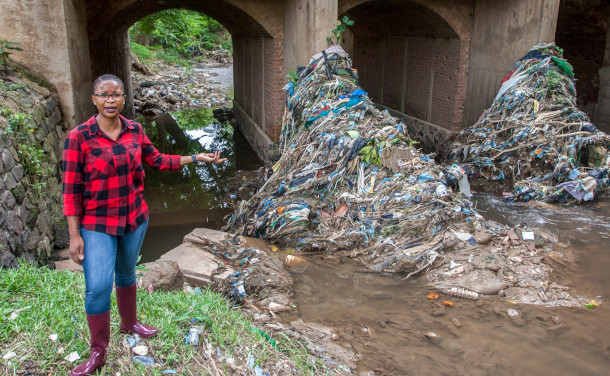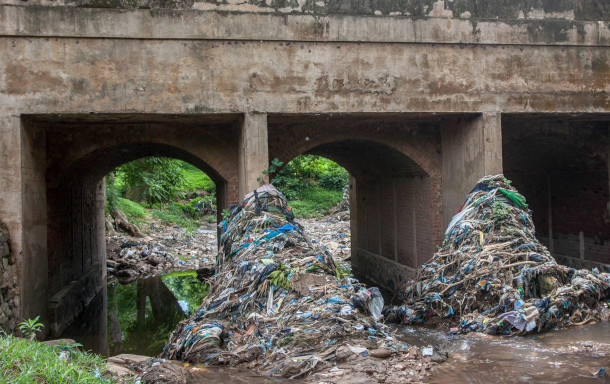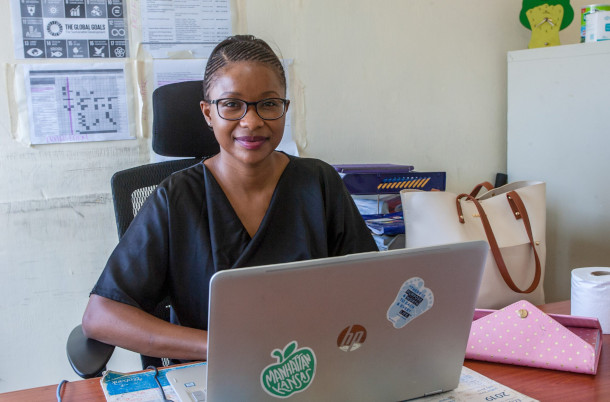Winning A Fight Against Thin Plastic Bags
Air Date: Week of July 16, 2021

Malawi’s commercial city of Blantyre. (Photo: Goldman Environmental Prize)
Worried about the environmental degradation caused by increasing plastic pollution in Malawi, Gloria Majiga-Kamoto organized a grassroots movement to fight the plastic industry and to support a national ban on thin single-use plastic. As a result of her dedicated campaigning, in July 2019 Malawi’s High Court upheld the ban on the production, importation, distribution, and use of thin plastics. Living on Earth's Bobby Bascomb spoke with Gloria Majiga-Kamoto, who has been recognized with a 2021 Goldman Environmental Prize.
Transcript
CURWOOD: As Peter Dykstra noted in the case of Goldman Prize winner Berta Caceres, advocating for environmental protection can be deadly. Fortunately for our next guest, there was a much happier outcome. Gloria Majiga-Kamoto, from Malawi has won the 2021 Goldman Prize for Africa for leading and winning the fight to get single use plastic bags banned in her country. Gloria Majiga-Kamoto spoke with Living on Earth’s Bobby Bascomb.
BASCOMB: Gloria, can you please first describe for us the plastic problem in Malawi? Paint a picture for us.
MAJIGA: So it's quite bleak. Our landholding size is very small, and we are quickly filling up the country with plastic. We're also agriculture based in our economy. So now agriculture is competing with plastics, because the place where we should be producing our food has now become a home for these plastics that are discarded. They're called little blue plastics the single use plastics, so you can see them pretty much everywhere. And they're also said to have become the new national flower, because you can find them on trees, and just pretty much everywhere.
BASCOMB: Yeah, yeah, I've spent quite a bit of time in Southern Africa. And I've seen that these, you know, huge fields, just so full of small plastic bags, it looks like that's what's growing there. Like instead of leaves, you have these plastic bags that you get in all the shops for some tiny little product you bought.
MAJIGA: Yeah, that's exactly what it looks like. And I mean, it can be quite frustrating to see it. Because as you just come into any area where there's economic activity, you increasingly see plastic waste, just around those areas. So as we're also developing our trade centers, as an economy, it's becoming an increasingly huge problem, even in areas such as the rural areas where you'd not expect this to be a problem.
BASCOMB: Well, to what extent is the plastic harming the economy and harming the ability of farmers to grow their products safely.
MAJIGA: So I really like to share this story, there was one farmer in particular that we worked with who received a goat from what we call the Pass on Project. So they would receive the gold and then expect that, you know, they could use the dung to produce organic manure and therefore help them to increase their productivity. But because most of these plastics are thrown in the field, we had a case where one of these goats ingested a piece of plastic and so she lost that goat. And that meant that she was basically not going to realize the benefits as had been intended by this program, because of just this one piece of plastic that ended up in the goats belly. And so I think for me, it sort of just gave me perspective to say that, you know, it really seems simple when you throw a piece of plastic away, but then it could actually alter somebody's livelihood.

2021 Goldman Environmental Prize winner Gloria Majiga-Kamoto stands in front of the Mudi River bridge where plastic bags and other waste products are often trapped. (Photo: Goldman Environmental Prize)
BASCOMB: You know, if you look at a map of Malawi, roughly a quarter or a fifth or so of the country is Lake Malawi. And of course, rivers will flow into the lake. It's an important feature of the geography and the economy, the lake. What effects are you seeing on Lake Malawi from all this plastic?
MAJIGA: So there's definitely been a lot of pollution. There's a lot of plastics in the lake and as it degrades into these little pieces, the fish tend to consume it. And we don't know what the impact of that is because we all consume chambo, we all have this fish. But there's really no research yet to know what the long term impacts are on human health. And we've also seen water levels going down simply because within the communities a lot of the waste that's thrown into the rivers, it also disrupts the flow of the rivers, which means that the contributory rivers are decreasing in terms of the water flow. And they're also then leading to this decrease in the water levels for the lake. There's not a lot that's being done about it so far. And even these communities don't understand the full impact of plastic within the communities.
BASCOMB: Well, how did you present this problem to communities to get their support for banning single use plastic?
MAJIGA: The first and most important thing I think, is to help people to see the human aspect because I think it's very hard to appreciate that you're actually altering somebody's life. So I mean, even if you just think about fishermen, the moment you inform them that listen, this is how much more you could be catching but half the time you pull out your nets, most of it is plastic, that's you losing some livelihoods that you could have gotten if you could catch a little bit more. So I think making it really relatable for them to understand how they are part of the problem, because it's not just somebody else who threw that waste away. We're all part of that problem. We've all been participating in one way or the other. Putting those stories together that also really helped us to then demonstrate to policymakers and decision makers that something needs to be done. And it's an urgent situation, because the longer we take, the more dire the impacts become.
BASCOMB: Well, the government of Malawi did try to deal with the single use plastic starting in 2015. Can you tell us about the early stages of that effort?
MAJIGA: So a lot of it started from when we were reviewing the Environmental Management Act. And when we advocated for the development of a single use plastics ban, that was one of the things that we had in mind. But as you know, it's been a long road. There was a lot of defiance from the companies, obviously for their own economic interests. And so one of the things that they said was, well, we provide jobs to 35,000 Malawians, which was really frustrating because you're thinking that you're putting 17 million people on the line because you're providing jobs for 35,000 people. It hardly makes sense. It's not even, you know, comparative, it's completely ridiculous. There's been a lot of political interference along this journey. So which is why we came in, because we saw the need for someone to really put a voice out there to say that we are watching, and we're expecting this to go through because we believe that, you know, we cannot put our environment at risk because of some economic gains. So we went on, and we joined the case as friends of the courts. But we also organized quite a number of marches to the courts just to persuade governments as well as the courts to expedite the hearings, because it was very time sensitive for us. The longer we waited, the more plastics we're putting out into the environment.

Plastic bags and other waste trapped at a bridge in the Mudi river in Blantyre, Malawi. (Photo: Goldman Environmental Prize)
BASCOMB: You organized a huge protest in 2018 to petition the government to act on single use plastics, but just a day before the protest was set to start, the courts actually held the ban, and the protest turned into a celebration. Can you tell us about that?
MAJIGA: So this was really crazy, because I'm not a huge fan of demonstrations. And one of my key strengths is harmony. So I prefer to sit down and have a conversation and make something out of it. So it was really fun when we say you know what, I think we've tried to talk this over, we have tried to show them all the different impacts so we're going to go there right to the court, and then say we want this case to be a priority. So we did organize the march, and we sent out the letters to have the march go on, and then receive the communication that oh, you guys don't need to come to the court, you just have to change your route, because already going to have the case hearing in the judge's chambers, so you don't need to come. But we said well, it's fine we'll still march and will still pass by the courts. So that was a really different approach for us and it was really exciting. And the march was so much fun it was a celebration. And to see all these people coming together, we had a lot of schoolchildren who also joined in, we had people coming out of their offices and just putting up banners and just saying we stand with you and we definitely want to kick out plastics. It was incredible and I think it shows just how much people are interested in fighting plastics in the country.
BASCOMB: Well, congratulations, that must have felt really, really great for you.
MAJIGA: It was. It was definitely incredible.
BASCOMB: So what happened after that? What kind of changes are you seeing in Malawi now, after the courts held the ban on plastic?
MAJIGA: I think one of the biggest changes that I have enjoyed watching is to see young people take so much initiative to come up with different solutions. So we've seen different enterprises coming up where young people are trying to recycle upcycle plastics. But also we've seen a lot more young people taking a front row in advocating about this and just trying to raise awareness and help people and communities understand. We've also seen government take more action, we've seen a couple of companies that have been shut down completely on the basis of the ban.
BASCOMB: And from what I understand the government is actually inspecting the companies to make sure that they're not still producing single use plastic bags illegally, which I guess they were immediately after the ban.
MAJIGA: Before the ban was put in place Previously, government had given a two year period for companies to transition, which involved them acquiring new technologies and machinery. Most of them did not do this, they did not transition, they did not use that time to transition. So some of them said that we are now producing thick plastics, but they were not. So the inspections partly to look at the machinery to ensure that the machinery they have is actually for producing the thicker plastics are not still the ones for the single use plastics.
BASCOMB: And since the ban has gone in place in earnest, have you noticed any difference in the landscape? I mean, do you still have these fields growing plastic? Or have they been cleaned up? Or what are you noticing as a citizen since then?

2021 Goldman Environmental Prize winner Gloria Majiga-Kamoto in her office at the Center for Environmental Policy and Advocacy (CEPA) in Blantyre, Malawi. (Photo: Goldman Environmental Prize)
MAJIGA: So the damage was so extensive Bobby, and I don't think it's going to take a year or two to clean up. But last year the government did put in a new initiative, it's called the National Cleanup Day. And what this event does, it sort of brings together people to clean up premises and different communities. It's also one way of raising awareness about the different regulations. They haven't really instituted a new process of managing the waste. So even when we clean up, it still all goes into a landfill. So there's really a need for us to come up with a way to ensure that the plastic that we're collecting as we clean up, it's actually being recycled or upcycled in one way. We're planning to construct different waste collection points in different communities, which is a really exciting project for me. And I think it's just one way of demonstrating that we need to have a plan, a very solid plan on how to manage the plastic as we clean up. It may not be today that we see all the water cleaned up, but it certainly will be cleaned up and we look forward to that day.
BASCOMB: Now from what I understand, Gloria, I don't want to be too personal here. But you're 30 years old, you're very young, to take on this issue and have so much success is just wonderful. What advice do you have for other young people or anybody really who's listening now and is concerned about a similar problem in their own community?
MAJIGA: I think it's first of all, I'm really privileged indeed to be quite young. I don't think anyone really walks through life and thinks that you will win such an award or get this kind of recognition at such a young age and especially because you're just doing it because you really just care genuinely. If something affects you it is your responsibility and your right to speak up about it and take action about it. Don't be afraid and especially for young women like us, will often you know, take on these kinds of issues and sit at tables where you're probably the only woman and being young it also sometimes feels like, you know, you don't really matter or you're not really significant. But listen, it matters because as long as you know it's a problem, then something should be done about it. Then get someone to do something about it.
CURWOOD: Gloria Majiga-Kamoto of Malawi is the 2021 Goldman prize winner for Africa. She spoke with Living on Earth’s Bobby Bascomb.
Links
Learn more about Gloria Majiga-Kamoto the 2021 Africa Goldman Prize Recipient
Learn more about plastic pollution in Malawi, Africa
The Guardian | “Malawi Wins Battle against Business to Reinstate Ban on Plastic Bags”
Living on Earth wants to hear from you!
Living on Earth
62 Calef Highway, Suite 212
Lee, NH 03861
Telephone: 617-287-4121
E-mail: comments@loe.org
Newsletter [Click here]
Donate to Living on Earth!
Living on Earth is an independent media program and relies entirely on contributions from listeners and institutions supporting public service. Please donate now to preserve an independent environmental voice.
NewsletterLiving on Earth offers a weekly delivery of the show's rundown to your mailbox. Sign up for our newsletter today!
 Sailors For The Sea: Be the change you want to sea.
Sailors For The Sea: Be the change you want to sea.
 The Grantham Foundation for the Protection of the Environment: Committed to protecting and improving the health of the global environment.
The Grantham Foundation for the Protection of the Environment: Committed to protecting and improving the health of the global environment.
 Contribute to Living on Earth and receive, as our gift to you, an archival print of one of Mark Seth Lender's extraordinary wildlife photographs. Follow the link to see Mark's current collection of photographs.
Contribute to Living on Earth and receive, as our gift to you, an archival print of one of Mark Seth Lender's extraordinary wildlife photographs. Follow the link to see Mark's current collection of photographs.
 Buy a signed copy of Mark Seth Lender's book Smeagull the Seagull & support Living on Earth
Buy a signed copy of Mark Seth Lender's book Smeagull the Seagull & support Living on Earth

